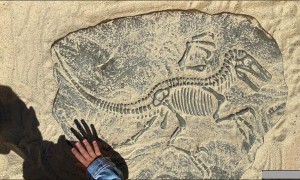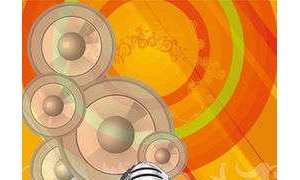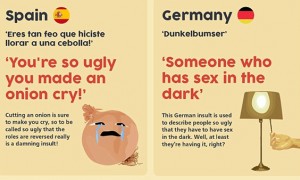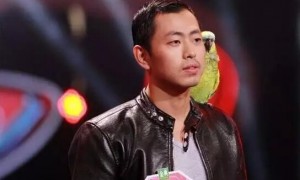Sofia 在教室里用着她的笔电,这时见 Bob 一拐一拐地走进来…
Sofia: What happened to your leg!?
Sofia:你的腿怎么了! ?
Bob: I got injured yesterday playing basketball with Henry and some of the guys.
Bob:昨天 Henry 找我去和他还有其他一些朋友一起打球,我打到一半受伤了。
Sofia: Poor you!
Sofia:真惨!
Bob: I sprained both my ankles—hence the crutches.
Bob:我两个脚踝都扭伤了,所以才会拿拐杖。
Sofia: How did that happen?
Sofia:是怎么发生的?
Bob: Henry passed me the ball but I missed it with my hands and stepped on it…
Bob:Henry 传球给我。我漏接了而且还踩到 …
Sofia: Well… at least it’s not a fracture.
Sofia:嘛,幸好不是骨折。
Sofia 说得对,幸好只是扭到而不是骨折。先来复习单字吧!
sprain (v.) 扭伤
sprain 动名词同形,在对话中意思是「扭伤」,比如:sprain the ankle (扭伤脚踝)、sprain the wrist (扭伤手腕)、sprain the shoulder (扭伤肩膀),注意主词为人而非身体部位。
Tommy sprained his ankle climbing the rocks next to the beach.
Tommy 在海边爬石头时扭到脚踝。
I don’t play much tennis anymore because I kept getting wrist sprains.
我不太打网球了,因为以前常扭伤手腕。
ankle (n.) 脚踝
ankle 意指「脚踝」,其他常见关节部位如:wrist (手腕)、elbow (手肘)、shoulder (肩膀)、knee (膝盖)。
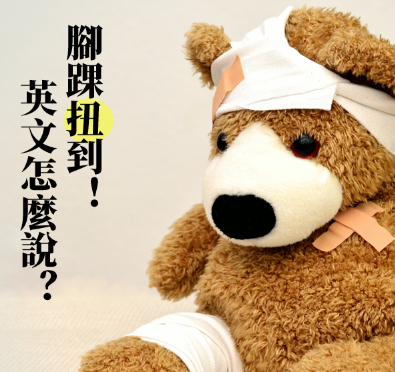
My friend has a tattoo on her ankle.
我朋友的脚踝上有刺青。
crutch (n.) 拐杖
crutch 意指「拐杖」,尤其指腿部受伤的病患在使用的 T 型拐杖,例如:walkin on crutches (靠拐杖走路)。如果是指老年人使用的「拐杖;手杖」,则是 (walking) stick 。
He’ll have to walk around on crutches for a while because of the car accident.
他出车祸后都靠拐杖走路。
The old man walked down the street slowly using his walking stick for balance.
一位老先生靠拐杖平衡,缓慢地走在街道上。
fracture (n.) 骨折
fracture 当名词时意指「断裂;骨折」;当动词时可指「断裂;折断」。骨折时通常会打石膏,「石膏」的英文则为 cast。
Tommy’s leg is in a cast. He got a fracture while playing football.
Tommy 因为腿部骨折打着石膏。
Two of the patient’s ribs were fractured as CPR was being performed.
病患在被施行心肺复苏术的期间断了两根肋骨。
Sofia 是否也曾经在运动时受伤呢?继续听他们聊下去吧!
Bob: Yes, I’ve also got some bruises, but they are just minor injuries.
Bob:对啊,我还有一些瘀青,不过只是轻伤。
Sofia: Still looks like a sore one though. Speaking of injuries, I hurt myself playing table tennis during gym class last week.
Sofia:但你的瘀青看起来还是很严重。说到受伤,我上礼拜上体育课时也受伤了。
Bob: I’m guessing it probably wasn’t because you slipped on a ping-pong ball, haha. What happened?
Bob:不可能你踩到乒乓球跌倒吧,哈哈。所以是怎么了?
Sofia: Well… do you remember me telling you how much of a hunk my gym teacher is? He used to be a professional athlete—very handsome. Anyways, last week I kept staring at him during the class, and I ended up with a crick in my neck.
Sofia:这个嘛… 你还记得我跟你说我的体育老师超壮吗?他以前是职业运动员…超帅的。反正就是上礼拜我上课时一直盯着他看,然后脖子就抽筋了。
Bob: That’s not even a sports injury! I thought you had maybe pulled a muscle or something.
Bob:那根本不算是运动伤害!我还以为你是肌肉拉伤还怎么的。
Sofia: It was in gym class! Surely that still counts as a sports injury? Haha.
Sofia:因为是在体育课受伤啊!当然还是算运动伤害?哈哈。
Sofia 对运动伤害的定义还真广,小 V 甘拜下风。来复习单字吧!
bruise (n.) 瘀青
bruise 动名词同形,当动词则指使瘀青,当名词时意指「瘀青」,常见用法如:a bruise on + 身体部位。
My legs are always covered in bruises after playing rugby.
打完橄榄球后我的腿上常常都是瘀青。
minor injury (n.) 轻伤
minor 意指「轻微的」,minor injury 即是「轻伤」,如扭伤、拉伤、擦伤等等。与其对应的是 major injury (重伤)。
It’s only a minor injury. Just put a Band-Aid on it.
在伤口上贴个 OK 绷吧,那只是个轻伤。
crick (n.) (颈部、背部) 抽筋
crick 为名词,意思是「抽筋」,尤其指「颈部、背部的抽筋」,常见用法如:a crick in + 身体部位。
He has terrible posture. He’s always slouching and complaining of neck cricks.
他姿势不良,总是驼背然后抱怨自己脖子抽筋。
Because of his poor form when doing deadlifts, he ended up cricking his back.
他做硬举时姿势不良所以扭到脖子。
pull a muscle (phr.) 肌肉拉伤
pull 意指「拉」,muscle 则指「肌肉」,因此很直觉地 pull a muscle 即是「肌肉拉伤」。
Warming up before exercise can help reduce your chances of pulling a muscle.
运动前暖身能够帮助避免肌肉拉伤。



